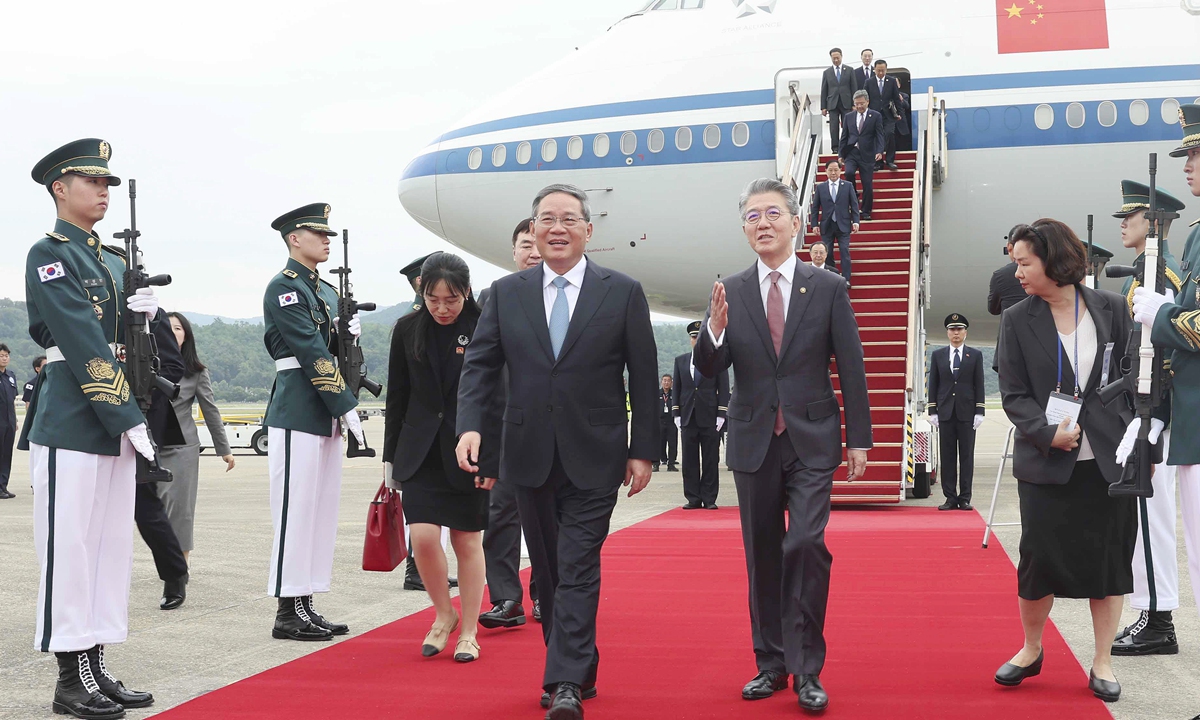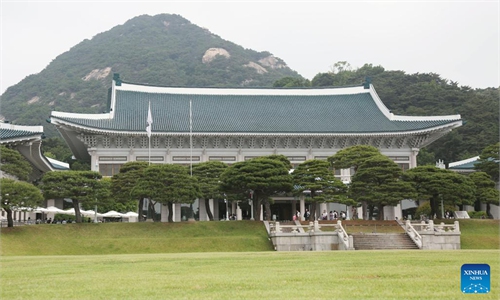China-Japan-S.Korea trilateral summit meeting to boost cooperation
Premier Li holds meetings with Yoon, Kishida respectively

Chinese Premier Li Qiang arrives in Seoul, South Korea on May 26, 2024 to attend the ninth Trilateral Summit Meeting among China, Japan and South Korea.Photo: Xinhua News Agency
Chinese Premier Li Qiang arrived in Seoul on Sunday to attend the ninth Trilateral Summit Meeting among China, Japan and South Korea from Sunday to Monday. Li had a meeting with South Korean President Yoon Suk-yeol and Japanese Prime Minister Fumio Kishida on the day of his arrival, with Chinese experts saying the three major economies in East Asia will make pragmatic efforts to make sure the economic development and integration of the region will not be affected by bloc confrontation and geopolitical crises.
The three countries are currently facing different challenges due to the disruption of the global supply chain and other impacts, so they all have a sincere motivation and realistic desire to resume the trilateral mechanism at this point, as they want to seek cooperation with each other and prevent potential instability by boosting senior-level communication between the governments, analysts noted.
According to the Xinhua News Agency, the trilateral summit resumes more than four years after it was last held in China's Chengdu in 2019. Li, together with the leaders of Japan and South Korea, will attend key events including the trilateral summit meeting and the China-Japan-South Korea business summit where they will exchange views on trilateral cooperation.
Trilateral mechanism
Li Haidong, a professor at the China Foreign Affairs University, told the Global Times on Sunday that China, Japan and South Korea are standing at a critical juncture of whether to choose bloc confrontation or to build a community with shared future, and this will decide whether the region maintains peace and development or sees more instability and tensions.
Da Zhigang, director of the Institute of Northeast Asian Studies at the Heilongjiang Provincial Academy of Social Sciences, told the Global Times on Sunday that the trilateral summit meeting should have been held earlier, but due to the impact of the COVID-19 pandemic and tensions between South Korea and Japan during the term of Yoon's predecessor Moon Jae-in, the trilateral mechanism stagnated.
"Today, due to Russia-Ukraine conflict and China-US tensions, global supply chains and industrial chains have all been interrupted, and the region's three major economies are facing different challenges. Now they realize that it's time to bring trilateral ties back on track so that they can seek help from each other to ensure a stable recovery of the economy and to boost future growth by promoting regional economic integration," Da said.
The three countries used to be complementary in terms of economy and trade, but now, their industries are becoming each other's main competitors, and it's true that under pressure from Washington, Seoul and Tokyo might be forced into joining some small blocs dominated by the US to contain China, so it's necessary for the leaders and senior officials from the three countries to maintain frequent and close communication to prevent the region from falling into confrontation by seeking pragmatic cooperation in the fields of economy, trade and cultural exchanges, said experts.
Lü Chao, an expert on the Korean Peninsula at the Liaoning Academy of Social Sciences, told the Global Times on Sunday that the economic size of the three countries makes up about 25 percent of the world economy, and the trade between them reportedly takes up about 20 percent of the global trade volume, so the cooperation among them not only benefits the peoples of the three countries, but is also important for global recovery.
There are many long-standing and complicated issues between the three countries, including disputes over territory and historical issues, as well as Fukushima nuclear-contaminated water release and the impact from the US, so it's unrealistic to expect the trilateral summit meeting to solve all of these problems immediately, but the key is finding a way to prevent these problems from undermining the mutual-beneficial and necessary economic and trade cooperation, as well as people-to-people and cultural exchanges, analysts said.
Need for cooperation
During the meeting between Li Qiang and Yoon, the Chinese premier called on South Korea to work with the Chinese side to grasp the general direction of friendship and mutual trust between the two countries, and respect each other's core interests and major concerns, Xinhua reported. It is also hoped that the two sides can be each other's friendly neighbor of mutual trust and partner of mutual achievement, and promote a sound, steady and substantial development of China-South Korea relations, Li Qiang said.
South Korea adheres to the one-China principle and this position remains unchanged, Yoon said at the meeting, Xinhua reported.
Yoon underscored the importance of working with China to address rising economic uncertainties in the wake of the ongoing crises in Ukraine and Gaza. "I hope we can continue to strengthen our cooperation amid today's global complex crises," South Korea's Yonhap News Agency reported him as saying.
Da said the Yoon administration used to choose the strategy of completely leaning toward the side of the US but found that it brought limited benefits, and also caused South Korea to suffer some losses due to tensions with China.
"After the South Korean legislative elections in April, Yoon has to face the situation of the opposition party dominating the parliament throughout the rest of his term, adding to economic problems like soaring prices. Yoon is now taking action to be more pragmatic and try to fix ties with its top trading partner," Da said.
South Korea is the chair of the trilateral meeting this year. As Yoon has already improved ties with Japan over the past two years, he will take the important chance this year to fix ties with another pillar of this trilateral mechanism, experts noted.
Li Qiang said at the meeting that foreign enterprises are an indispensable force for China's development and its mega-market will always be open to foreign companies. Li Qiang said China welcomes South Korean companies including Samsung to continue to expand investment and cooperation in China and share more of the new opportunities brought about by China's new development.
Li Qiang also called on enterprises from China and South Korea to tap deeper into their cooperation potential in new areas such as high-end manufacturing, digital economy, artificial intelligence, green development and biomedicine, so as to continuously upgrade bilateral economic and trade cooperation and achieve greater win-win cooperation.
Li Qiang and Yoon agreed on Sunday to accelerate the second phase of Free Trade Agreement (FTA) negotiations between the two countries. The two sides also agree to hold high-level strategic dialogues between foreign ministries and the vice-ministerial level "diplomatic and security 2+2 dialogue" at the appropriate time, and the two sides also agree to resume China-South Korea people-to-people, cultural and youth exchanges, to provide more convenience for personnel exchanges between the two countries.
Be pragmatic
Under pressure from the US Federal Reserve's interest rate decisions, Japan and South Korea are facing pressure such as currency devaluation, but this will also bring advantages to their products when exporting to China, which has a mega-market and also demands for more foreign investment, so this will bring common interests to the three countries as they all face their challenges, Bai Ming, a research fellow at the Chinese Academy of International Trade and Economic Cooperation, told the Global Times on Sunday.
It's true that Japanese and South Korean companies are moving to Southeast Asia, and also joining the US-led blocs to contain China in the fields of AI technologies and semiconductors, so it's important for China to enhance communication with them to prevent risks from damaging the entire trilateral mechanism, Da said.
Li Qiang on Sunday urged Japan during his meeting with Kishida to earnestly fulfill its responsibilities and obligations regarding the release of the nuclear-contaminated wastewater from the Fukushima Daiichi Nuclear Power Plant. The release of the wastewater affects the health of humanity, Li Qiang added, Xinhua reported.
China will safeguard its principles and core interests when exploring cooperation with Japan and South Korea, said analysts, adding that the three countries will also stay pragmatic in pushing cooperation in fields not directly related to difficult issues like territorial disputes and historical issues, fixing ties from the easiest parts - trade and cultural exchanges.


